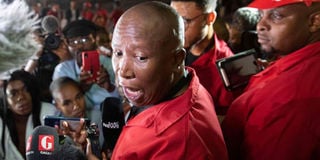SA’s politics gets personal as MPs throw decency out of window

Julius Malema, leader of the Economic Freedom Fighters (EFF) political party addresses the media after disrupting the State of the Nation Address by South African President Cyril Ramaphosa at the Parliament of South Africa in Cape Town on February 13, 2020. PHOTO | BRENTON GEACH | AFP
What you need to know:
President Cyril Ramaphosa and Economic Freedom Fighter leader Julius Malema at the centre of the fight.
The fight, while brief, was deeply damaging to Ramaphosa’s efforts to portray South Africa as something other than a “banana republic”.
Accusations of violence against women were thrown back and forth across parliamentary aisles this week as South Africa’s politics descended to its lowest level yet against a backdrop of increasing social, economic and racial tensions.
President Cyril Ramaphosa was accused by Economic Freedom Fighter (EFF) leader Julius Malema of having beaten his former wife.
A furious Malema made the allegation after one of Ramaphosa’s ruling African National Congress (ANC) colleagues had accused Malema of gender-based violence — a particularly touchy subject in a country rived by violent assaults, rape and the murder of women.
Amid outrage from ANC benches, Malema was evicted from the House, his party following him in solidarity, after the debate around Ramaphosa’s State of the Nation address had all but been wrecked by the personal attacks.
The EFF was at the forefront of efforts to force former president Jacob Zuma from office in 2017 and early 2018, causing disruptions every time Zuma was in Parliament to address MPs, but this week’s confrontation became more bitterly personal than anything previously seen.
The air in what is supposed to be the country’s place of maximum decorum was thick with insults, threats and heavily-charged outcries.
Beyond the theatre of the moment was the very grave concern, held in almost all quarters, that such an important debate — in which Ramaphosa was attempting to show the world and watching potential investors that he was putting the country back on the path of sustainable, inclusive growth — could be allowed to deteriorate so badly, thereby painting a very negative picture of the country and its future.
So poor were relations in the immediate wake of the uproar that there were no communications between the ANC and EFF.
Subsequent moves were made to smooth over the issue — but even so, a question now hangs over the EFF’s willingness to continue assisting the ANC to take back many cities and towns where the EFF’s vote, one way or the other, determines which party rules.
Malema said he had tried to apologise to Ramaphosa, but the ruling party benches would not allow him to do so.
Ramaphosa took the high ground by personally apologising to Malema from the podium for comments of ANC MP Boy Mamabolo, who had accused the EFF leader of abusing his wife, Mantoa.
It was in response to that accusation that Malema accused Ramaphosa of abusing his late ex-wife, Nomazizi.
When Ramaphosa had finished his address in which the apology was made, Malema rose — but, as he tried to speak, he was shouted down by ANC MPs and asked to sit by the presiding officers.
Subsequently, Malema said that “following President Ramaphosa’s apology to my wife and family, I stood in parliament to return the same hand to him, his departed wife, Nomazizi, and his entire family. I was, however, drowned down by ruling party benches without any protection from presiding officers”.
“After a long discussion with my wife about the president’s apology, I have decided to pen down the apology that I should have communicated on the platform of the joint sitting of parliament, where it belonged.”
Malema said his wife Mantoa had been “assaulted through terrible, malicious and harmful comments” by an ANC MP during (the State of the Nation address) last week and that the same slurs were repeated in the media by the ANC MP who first made them.
Malema and his wife lost no time in laying charges against that MP.
He had tried to ignore the repeated slurs, saying he was unwilling to engage them directly in an important national debate.
“Each time we avoided the question because of its sensitivity, members of the ANC confused this to mean cowardice or worse, that I had something to hide,” said Malema.
However, Malema also admitted that he was wrong in making the counteraccusation against Ramaphosa.
“I hope the president can accept my apology, together with his family, which I offer sincerely. I also would like to apologise to all South Africans who were offended in the process, in particular victims of gender-based violence,” he said.
He had also phoned Ramaphosa and apologised.
For his part, the ANC MP who started the fight, Mamabolo, eventually apologised to Malema and his wife over his “insensitive” abuse claims.
Attorneys representing Malema and his wife said Mamabolo had needed to apologise — failure to do so would have led to him being sued for about US$67,000.
Commentators were unanimous in the view that, apologies after the event aside, the incident was definitely not helpful to SA’s case in terms of perceptions around the country’s growing indebtedness, failing major state-owned enterprises and high poverty, unemployment and social despair.
“The apologies were good, but the damage had already been done,” said one MP.
The fight, while brief, was deeply damaging to Ramaphosa’s efforts to portray South Africa as something other than a “banana republic” wherein decency is absent even from the most formal of occasions and in which fights, sometimes even physical ones, in the National Assembly have become increasingly common.





